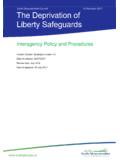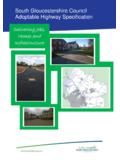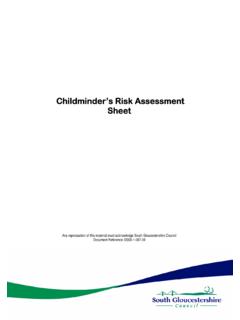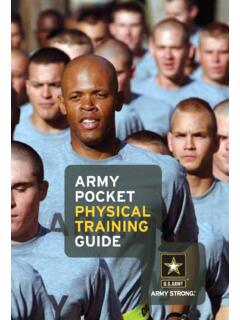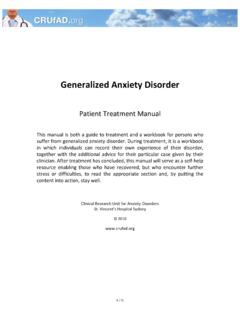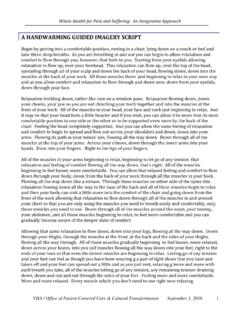Transcription of Anxiety - Classroom Resources for Schools
1 Anxiety - Classroom Resources for Schools Table of Contents Lesson Plan: Worries (to be used in conjunction with Worries PowerPoint presentation for KS1, KS2) pages 2-6 Worries Feedback Form (to be used in conjunction with Worries PowerPoint presentation for KS1, KS2) page 7 Anxiety , Panic Attacks, Phobia & Relaxation Techniques pages 8-21 Worries and Strengths Prompt Sheet pages 22-23 Confidence Skills Checklist page 24 Emotions and their associated thoughts, body reactions & resulting behaviours page 25 The Emotional Barometer: a template pages 26-28 Feelings Fan pages 29-32 Feelings & Target Cards pages 33-36 Feelings, Thoughts, Behaviour worksheet page 37 Worksheet: what can your brain focus on when you re feeling anxious?
2 Page 38 Relaxation Cards pages 39-40 Emotions word cards pages 41-52 Self Esteem Worksheet page 53 1 Key stage 1 & 2 Lesson Plan: Worries 15 minutes Key Concepts Understanding that our feelings and emotions have an affect everything we do in our lives Understanding that everyone has worries Understanding that emotional health can affect our ability to learn and be happy Recognise feelings and how they impact on our physical health Understand that help and support is available when needed Key Processes Develop self-awareness by reflecting on thoughts and feelings Assess and manage thoughts and feelings Use knowledge and understanding to recognise situations that
3 May cause a worry Develop skills to manage worries Recognise when to seek support and who may provide this Content What do we worry about Everyone has worries How do worries make you feel How they can affect our health and happiness Awareness of what helps and where to get support Learning Outcomes Recognise how worries can make you feel Understand that worries are normal and everyone has them Understand when and who to ask for help Appreciate that worries can be solved and made to go away Author: Deborah Shepherd School Nurse 2 Activity PowerPoint Presentation 15 Minutes Resources PowerPoint Introduction and ground rules.
4 Not calling out. Put your hand up to give answers and don t worry there are no right or wrong answers Begin PowerPoint Slide 1. WORRIES Grown-ups sometimes call worries, stress or Anxiety . So what is a worry? I think of it as a bad thought that gets stuck in your head. You might not know exactly what it but IT s just bothering you. Ask the group for examples of things that might cause a worry. Tab to next slide Slide 2. What do we worry about? School work We all learn in different ways. We are all good at different things. Some people find things more difficult than others. Do you think you will be able to learn if you are worried?
5 Friendships You might feel you don t have any or fall out with the ones you do have. You might think someone is not being very nice to you or saying things about you. It s important to be kind to each other. Appearance You may worry about being different, you may need to wear glasses. You may feel small, too big, too short or tall. We are all that is what makes each of us special Parents and family Parents sometimes say or do things and don t realise how it may make you feel or worry. Things at home Getting into trouble or being told off Being ill or getting sick The dark Being afraid of the dark, even though we know there s nothing there.
6 We can worry about almost It s normal to think about things. It helps us to keep safe and manage dangers. Worries can help us think about things so that we can make sensible choices and decisions. 3 But sometimes worries can get stuck and then we think about them all the time. So it s important to Tab to next slide Slide 3. Everybody has worries We all have worries me, your teachers and your parents. Everyone has What is important is how we manage them. Can anyone tell me what a worry can feel like? Tab to next slide Slide 4. How do we feel? After a short time the slide will automatically fill with various feelings, weak, sad, tearful, unhappy, sick, lonely, confused, hot, angry, frustrated, worn out, headache, dizzy, scared, racing heart or butterflies in your tummy sweaty is the last one.
7 Worries can sometimes make us feel ill or sick. They can make us feel tired so we have less energy to do things. Worries can take over our thoughts and we may not be able to concentrate or do our work, we might forget things. What might happen then? We may get angry, confused or frustrated. We could become unhappy or tearful. Will people know why? What can we do? Tell Tab to next slide Slide 5. What helps? Tab keyboard each time for images to appear with what helps to manage worries. Images appear in the following order: Ask for help at home Your parents love you and want you to be happy.
8 They could help you or speak to you teacher if you feel you can t. 4 Ask you teacher Don t be afraid they are there to help you. It will be useful for your teachers to know if you don t understand something because you may not be the only person in your class. They can then explain it more simply or show you how to do something again. Talk to your friends Your friends may be feeling the same and you can help each other. Talk to someone you trust Sharing your worries and fears will help you get support to solve them and make them go away. If you really can t tell someone writing it down is OK.
9 Exercise Doing physical things like sport, playing football, dancing or riding a bike can help us to relax and not think about our worries. It can help us to be worry free and escape from thoughts and feelings. Eat healthily Sometimes if we have worries we can eat too much or not want to eat at all, so eat healthy. Sleep well Sleep is very important. What happens when we sleep? Our bodies need to sleep to keep them working properly. Sometimes worries can keep you awake even if our body wants to sleep. Worries can do this so it is important to talk about them so as you can make them go away.
10 Take time to relax - Relaxation is another word for being calm it is something you can practice. Can you think of how you might calm yourself? Breathing slowly - In through your nose and out through your mouth slowly. As you breathe in feel the calm, cool air filling your body and when you breathe out feel the tense hot air leaving your body. You could do this slowly, up to 5 times. You can choose a special memory - think of a happy time or place when you were having fun. Try to remember all the very small things of that special memory. 5 What were you wearing? How did the air smell? What could you hear?


